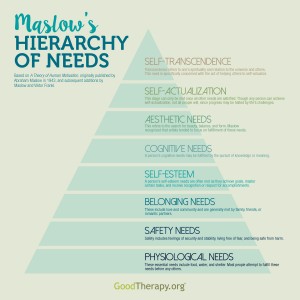Maslow’s Hierarchy of Needs
 Maslow’s hierarchy of needs is a theory that was proposed by psychologist Abraham Maslow in a 1943 paper titled A Theory of Human Motivation. The theory describes, in five stages, what he believed to be necessary for human subsistence and satisfaction.
Maslow’s hierarchy of needs is a theory that was proposed by psychologist Abraham Maslow in a 1943 paper titled A Theory of Human Motivation. The theory describes, in five stages, what he believed to be necessary for human subsistence and satisfaction.
The Five Stages
Maslow’s hierarchy is intended to track growth and development in human beings, beginning with infants, who aim to have only their most basic needs met. Typically, people reach different stages of the hierarchy throughout life, and at different times they might experience a deficit in a certain stage. When this occurs, a person will often temporarily abandon pursuit of a higher stage in order to have the more fundamental needs met. However, not all adult humans reach the top of the hierarchy, and poverty, illness, and other factors can interfere with a person’s development in Maslow’s hierarchy.
People who have not had their needs met in one area might also have their needs from another stage sufficiently met. For example, a person in poor health who has little financial security may be part of a community, have an intimate partner, and maintain close relationships with family and friends. Thus, the person’s safety needs are not adequately met, but community and belonging needs are. One might also have every fundamental need met but suddenly experience a threat to safety and shelter. In order to maintain this essential of survival, that person may then leave off pursuit of esteem or belonging needs until the threat to safety passes.
Maslow’s hierarchy originally contained five stages:
- Physiological needs: These are the needs necessary to maintain life: oxygen, food, and water. These basic needs are required by all animals and are the primary focus of infants.
- Safety needs: When an individual’s physiological needs are met, the focus typically shifts to safety needs, which may include health, freedom from war, and financial security.
- Community and belonging: If safety and physiological needs are met, a person will focus on the need for a community and love. These needs are typically met by friends, family, and romantic partners.
- Esteem: Esteem is necessary for self-actualization, and a person may work to achieve esteem once needs for love and a sense of belonging are met. Self-confidence and acceptance from others are important components of this need.
- Self-actualization: Self-actualization is the ability to meet one’s true potential, and the necessary components of self-actualization vary from person to person. A scientist may be self-actualized when able to complete research in a chosen field. A father might be self-actualized when able to competently care for his children.
Between esteem and self-actualization, Maslow later added cognitive and aesthetic needs, which refer to what he considered the needs of academics and artists, respectively.
Viktor Frankl, a prominent 20th century psychologist and the founder of logotherapy, later added self-transcendence as a final stage in Maslow’s hierarchy, bringing the total number of stages to eight. This level concerns an individual’s ability to experience spirituality and relate to the larger universe.
Maslow’s Hierarchy and Mental Well-Being
Maslow argued that the failure to have needs met at various stages of the hierarchy could lead to illness, particularly psychiatric illness or mental health issues. Individuals whose physiological needs are not met may die or become extremely ill. When safety needs are not met, posttraumatic stress may occur. Individuals who do not feel love or belonging may experience depression or anxiety. Lack of esteem or the inability to self-actualize may also contribute to depression and anxiety.References:
- Huitt, W. (2007). Maslow’s hierarchy of needs. Educational Psychology Interactive. Valdosta, GA: Valdosta State University. Retrieved from http://www.edpsycinteractive.org/topics/regsys/maslow.html
- Martin, D., & Joomis, K. (2007). Building teachers: A constructivist approach to introducing education. Belmont, CA: Thomson/Wadsworth.
- Maslow’s Hierarchy. (n.d.). Retrieved from http://changingminds.org/explanations/needs/maslow.htm
Last Updated: 12-14-2015
- 24 comments
- Leave a Comment
Instantly Ageless
December 28th, 2015 at 2:24 PMI truly enjoy looking through on this internet site, it has got superb blog posts. “A short saying oft contains much wisdom.” by Sophocles.
Roz
March 16th, 2016 at 4:21 PMEnjoyed reading this article – I’m 6 months into my counselling course and this caught my eye as we’ve been taught about it. I can see what stages I relate to and can’t see anything to disagree on.
Augustine W
June 8th, 2016 at 10:59 AMThis site has really helped me in my learng.
Leave a Comment
By commenting you acknowledge acceptance of GoodTherapy.org's Terms and Conditions of Use.

